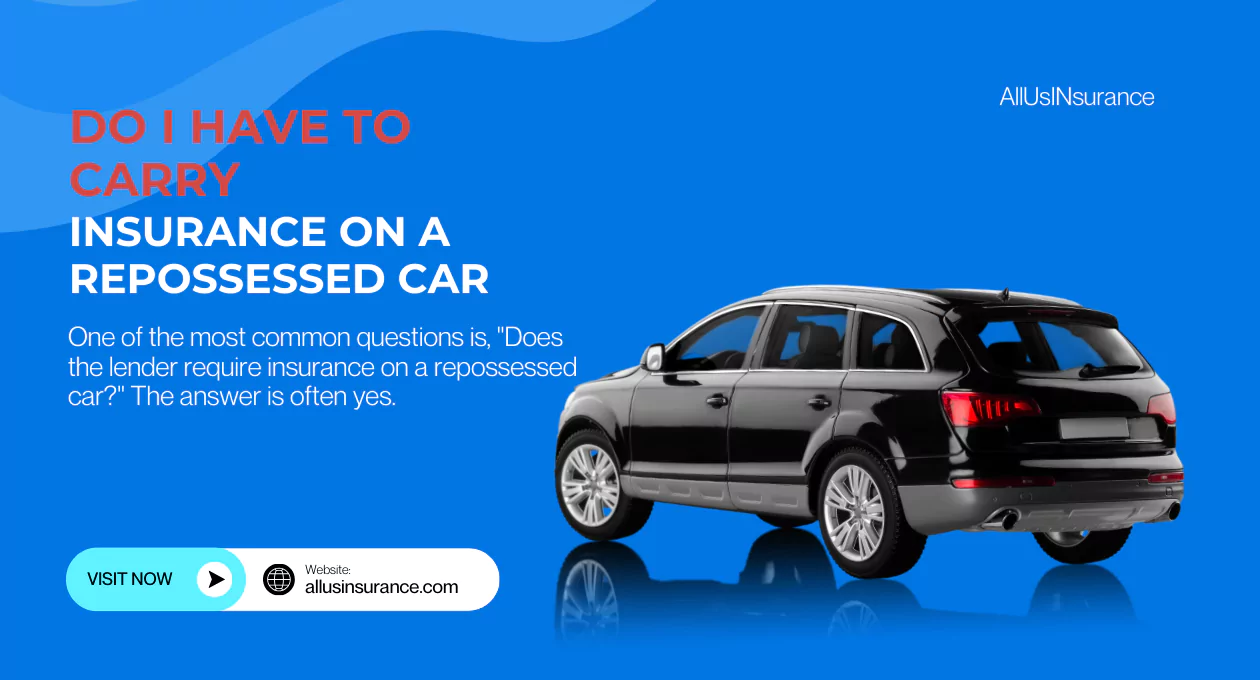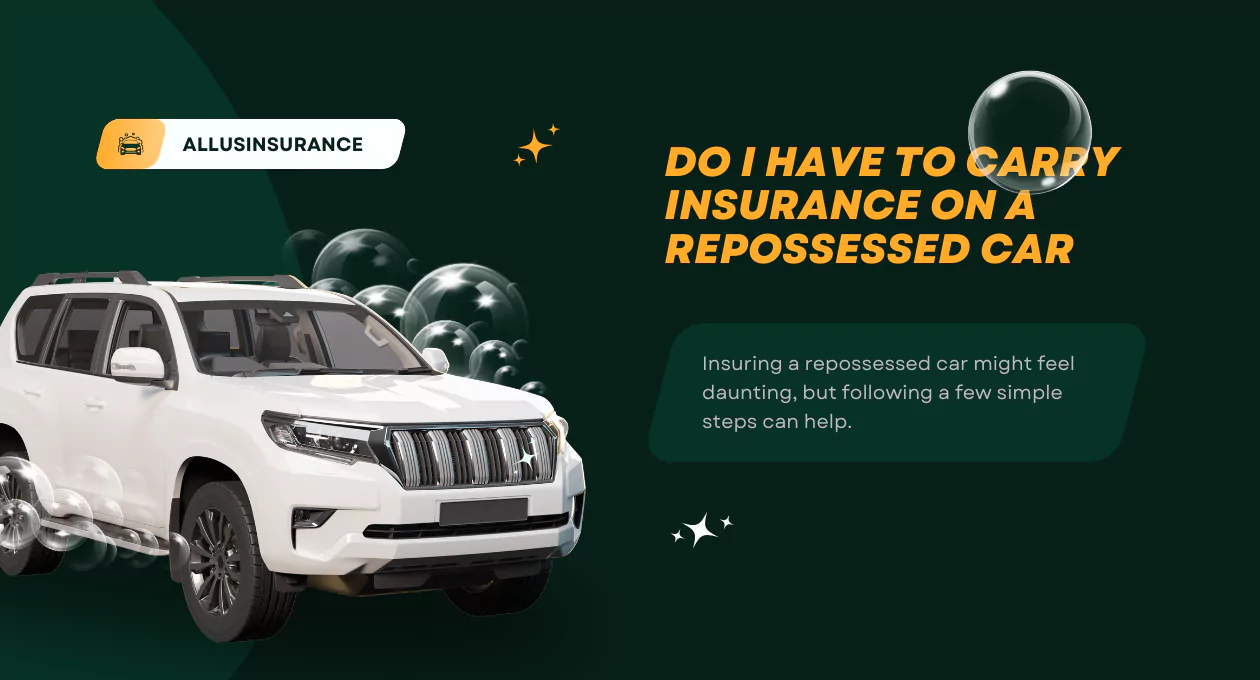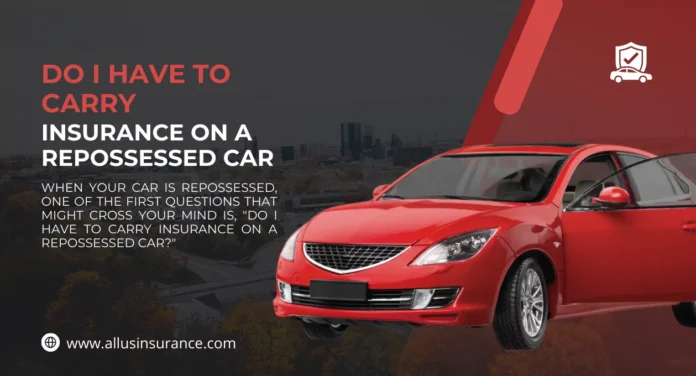When your car is repossessed, one of the first questions that might cross your mind is, “Do I have to carry insurance on a repossessed car?” The repossession process is already stressful enough, and dealing with insurance requirements can add another layer of confusion. Many car owners are unsure whether they still need insurance for repossessed vehicles once the car is taken back by the lender.
However, the reality is that the lender’s insurance requirements for repossessed vehicles are often stricter than you might think. Understanding the insurance requirements during car repossession is crucial to avoid unnecessary costs or legal consequences.
Introduction to Repossessed Cars and Insurance Requirements
Repossessed car insurance requirements can be tricky to navigate, especially if you’re uncertain about your rights and responsibilities after a car is taken back by the lender. When a car is repossessed, the lender takes possession because the borrower has failed to keep up with the agreed payments. This often leads to a lot of confusion around insurance.
After repossession, it’s common to wonder if you are still responsible for maintaining insurance for repossessed vehicles. While the car may no longer be in your possession, it doesn’t automatically mean you can drop insurance altogether. Lenders generally still expect the vehicle to be insured until it’s either sold or fully paid off.
Understanding the Legal Aspects of Car Repossession
Car repossession and insurance laws vary by state, so it’s important to understand how the laws apply to your specific situation. Generally, when your car is repossessed, the lender takes ownership but doesn’t cancel the loan. The car is still considered collateral, meaning that the lender can demand insurance on a car that was repossessed.
Laws regarding repossession and vehicle insurance policies can be complex. In some states, if the vehicle is returned to the lender, you may still be required to carry insurance until the debt is resolved. Failure to comply could lead to higher charges or additional financial penalties.
Do You Need Insurance on a Repossessed Car?
Many people ask, “Do I need car insurance after repossession?” The answer isn’t as simple as a yes or no. It depends on your specific circumstances. Typically, if you’re no longer in possession of the vehicle, it might seem logical to cancel your insurance. However, that’s not always the case.
Most lenders will still require liability insurance on repossessed vehicle, as they are concerned with potential damage to the vehicle while it is in their possession. If your lender requires this, you’ll need to follow their repossession and lender insurance requirements to avoid penalties.
Types of Insurance Required for Repossessed Cars
There are different types of coverage available, and the insurance requirements during car repossession will depend on the lender’s policies. Typically, repossessed cars need at least liability insurance, but some lenders also require full comprehensive insurance for repossessed cars.
Comprehensive insurance for repossessed cars covers damage to the vehicle that isn’t caused by a collision. This might include damage from weather or theft. Liability insurance on repossessed cars covers injuries or damages to others in the event of an accident. It’s often required by law and most lenders.
What Happens if You Don’t Have Insurance on a Repossessed Car?
Failing to maintain insurance on a repossessed vehicle could have serious consequences. If your vehicle is not insured, you might be held responsible for any damage that occurs while it is in the possession of the lender or a third party. This can significantly affect your financial situation.
If the vehicle is damaged and you don’t have insurance, your lender may enforce additional repossession and vehicle insurance policy rules, including charging you for repairs. Moreover, what happens if a repossessed car isn’t insured is that the lender may seek to recover the cost of repairs or damages, which can add more debt to your account.
Does the Lender Require Insurance on a Repossessed Car?
One of the most common questions is, “Does the lender require insurance on a repossessed car?” The answer is often yes. Lenders generally require insurance on the vehicle even after repossession to ensure the car retains its value. If the car is damaged, the lender wants to ensure they aren’t left with a worthless asset.

Most lenders will require insurance on a repossessed vehicle , and they may impose lender’s insurance requirements for repossessed vehicles if the borrower fails to maintain coverage. If you don’t comply, the lender may force-place insurance, which is typically more expensive than regular insurance policies.
Is Comprehensive Insurance Always Necessary for Repossessed Cars?
Is comprehensive car insurance required for repossession? The answer depends on the lender. Some may require full coverage on a repossessed vehicle, especially if the car has significant value. Others may only require liability insurance if they believe the car is not worth the additional cost of full coverage.
Repossessed vehicle insurance options can vary, but if you are unsure, it’s always a good idea to check with your lender. While comprehensive insurance for repossessed cars may not always be mandatory, it can provide additional peace of mind that your car will be protected from unexpected damages.
Can I Remove Insurance from a Repossessed Car?
Once your car is repossessed, you may wonder, “Can I remove insurance from my repossessed vehicle?” In some cases, it might be possible to cancel your insurance if the car is no longer in your possession, but that depends on the lender’s policies.
Even if the vehicle is no longer in your possession, some lenders may still require you to maintain insurance policies for repossessed cars explained. If you cancel your insurance without the lender’s approval, you could face legal or financial consequences.
How to Insure a Repossessed Car: Tips and Best Practices
Insuring a repossessed car might feel daunting, but following a few simple steps can help. First, check your repossession and vehicle insurance policy to see what coverage is required. If your lender insists on full coverage, you’ll need to provide that. If only liability insurance is necessary, choose a provider that offers affordable plans.

When seeking insurance for a repossessed vehicle, it’s important to take into account both the car’s value and any requirements set by the lender. Doing so will allow you to choose the most suitable and affordable coverage for your needs.
Alternatives to Full Insurance for Repossessed Cars
Not everyone can afford full insurance on a repossessed car. In these cases, alternatives like liability-only insurance may be a viable option. Liability insurance helps pay for damages you cause to other people or their property in an accident, but it does not cover any damage to your own car.
However, insurance requirements during car repossession might still force you to carry additional coverage. If you can’t afford full coverage, speak with your lender about your options, as they may allow a lower level of coverage or a temporary policy.
FAQs about “do i have to carry insurance on a repossessed car”
Is insurance required for a repossessed car?
Yes, you may still be required to carry insurance on a repossessed car, especially if the lender mandates it. Insurance helps protect the lender’s collateral until the loan is resolved.
What insurance do I need for a repossessed car?
Typically, liability insurance is required for repossessed vehicles. Some lenders may also require comprehensive insurance for repossessed cars depending on the vehicle’s value.
Can I remove insurance from a repossessed car?
While you might want to cancel insurance, many lenders require you to maintain coverage. Always check with your lender before canceling to avoid penalties or additional costs.
What happens if a repossessed car isn’t insured?
If a repossessed car isn’t insured, the lender might place force-placed insurance on the vehicle, which can be expensive. You could also face financial liability if the car is damaged.
Does the lender require insurance on a repossessed car?
Yes, most financial institutions mandate insurance on a repossessed vehicle to safeguard their investment. Repossessed car loan and insurance rules typically include insurance coverage during repossession.
Conclusion: Final Thoughts on Insuring Repossessed Cars
To wrap things up, maintaining insurance on a repossessed car is often required by your lender to protect the vehicle’s value. Repossessed car loan and insurance rules vary, but in most cases, the lender will expect you to maintain some form of insurance, whether it’s liability insurance on repossessed cars or comprehensive insurance for repossessed cars.
While it may feel tempting to cancel your insurance once the car is repossessed, it’s crucial to check with your lender to avoid any potential legal or financial repercussions. Following the insurance for repossessed vehicles guidelines and understanding your obligations will help you navigate this tricky process with confidence.



